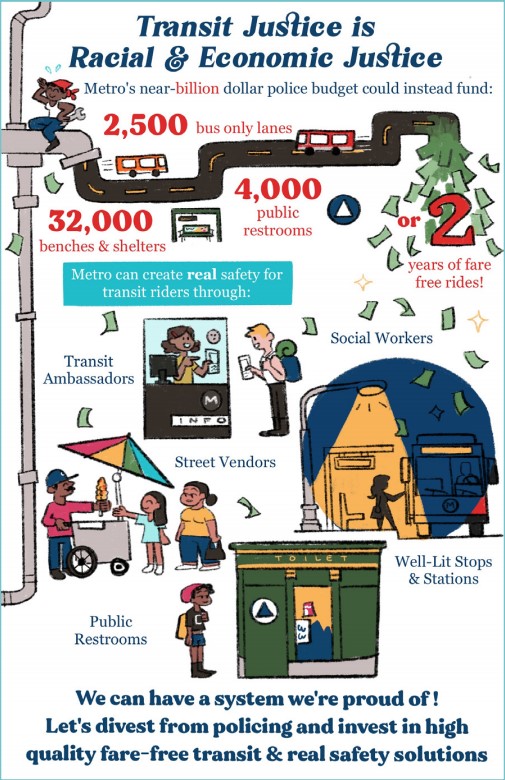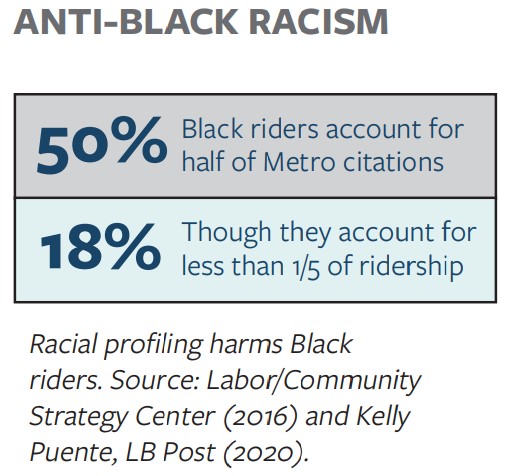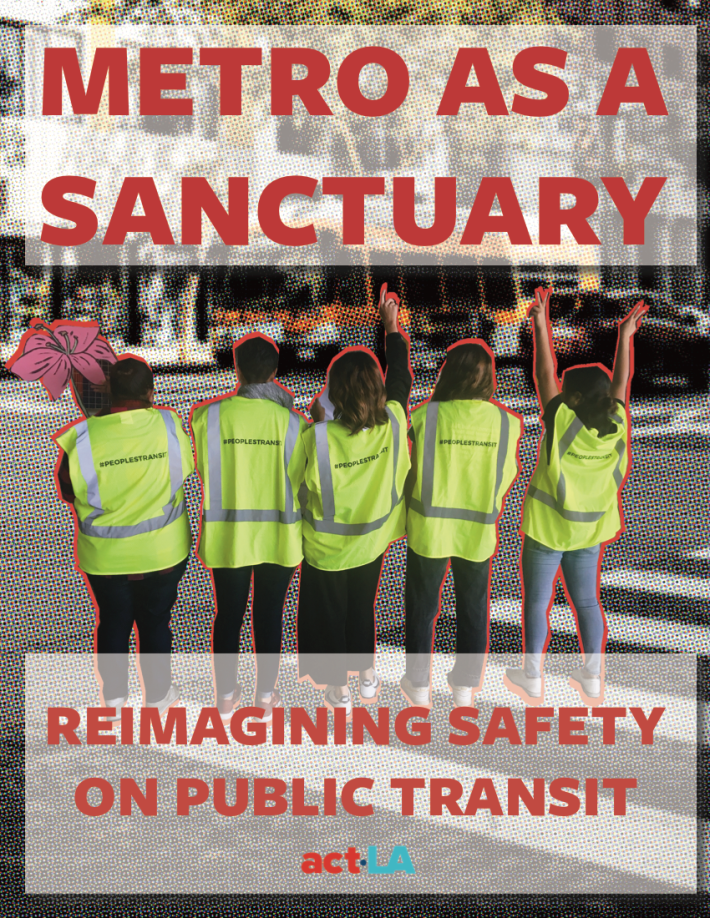Today, the Alliance for Community Transit (ACT-LA) released a new report, Metro as a Sanctuary: Reimagining Safety on Public Transit. The report reviews past issues with Metro transit policing and offers solutions to inform Metro's current process to reexamine and reform its security practices. In Metro as a Sanctuary, ACT-LA and its partners truly look to change the way Metro operates and the way the public perceives the Metro system. ACT-LA urges Metro "to push forward an agenda of being the most equitable transit agency in the country."
Transit security is particularly pertinent right now, as tomorrow the Metro board Operations Committee will consider an additional $110 million in funding for cost overruns on the current policing contract (staff report). Metro has formed a Public Safety Advisory Committee tasked with retooling Metro's approach to transit policing in advance of the agency's new law enforcement contract. Metro’s current five-year $130+million per year contract - with LAPD, L.A. County Sheriff Department and Long Beach Police Department - will expire in June 2022.
The Metro as a Sanctuary report is the product of ACT-LA, in collaboration with several partners: American Civil Liberties Union (ACLU) of Southern California, CoDesign @ Harvard Graduate School of Design, Public Counsel - Statewide Education Rights Project, and Tamika L. Butler Consulting.
The report opens by placing Metro's troubled transit policing record in the context of the current wave of civil rights movement
...Metro must commit to the long work of looking deeply at internal and external policies and practices and doing things differently. Anti-racism work must last beyond 2020 and continue as something that is fundamental and deeply embedded in all aspects of our organizations’, agencies’, and government operations. The way a transit organization approaches and acts on making their work and services more equitable must include a thorough examination of “safety.” If not clear in the past, 2020 crystallized the reality that “safety” has a different definition for different people. Many of the practices of enforcement and policing that are supposed to make and keep people safe have been used to police the mobility of Black people, Indigenous people, and other people of color (BIPOC) and reinforce inequities through gentrification, displacement and access to housing. Beyond that, policing and enforcement have been used to kill Black people at staggering and alarming rates.
The report outlines the flawed assumptions and practices that have resulted in serious issues with Metro policing today. These include:
- Metro assumes that "increasing the visibility and presence of armed police officers will create a safer experience for riders." "Metro does not address how riders’ sense of safety in relation to increased visible presence of armed and uniformed law enforcement varies depending on riders’ race or ethnicity, in the context of Metro’s current and historical enforcement practices, or in the context of LAPD, LASD, and LBPD’s records of violence against Black, Latinx, and unhoused residents of Los Angeles outside Metro."
- Metro utilizes designs and tactics known as "Crime Prevention Through Environmental Design (CPTED)" that result in hostile and austere environmental design.
- Excessive Metro policing of public nuisance (“Code of Conduct”) violations, and other low-level charges and misdemeanors.
- Disproportionate policing impacts on Black, low-income, and unhoused riders - as well as riders with disabilities.
The report outlines a broad range of proposed solutions, including:
- Fareless Transit: "Fare-free transit is a critical component, as ceasing surveillance and citation of riders for lacking proof of fare or boarding without payment would encourage higher ridership and safety in numbers. Additionally, fare-free transit would eliminate the need for gates and in their stead, conveniently located and welcoming entrances connect to spacious sidewalks near zebra crossings and popular pedestrian thoroughfares and intersections."
- Treating Transit Stations as Commons, Sanctuaries: "Transit stations and systems could be retooled as civic commons and even sanctuary for Angelenos, that not only meets basic physiological and safety needs, through increased presence of people, sources of employment and livelihood, and mobility services, but also belonging, information, resources and cultural connection."
- Replacing law enforcement with unarmed personnel: Metro presence could include uniformed transit ambassadors "trained in de-escalation and customer service" - similar to Bay Area transit assistants and elevator attendants. The report promotes unarmed Metro staff as "trust agents" serving riders and connecting them with services. Similar to libraries, where the "overarching perception of libraries [is] as places of sanctuary," appropriate staffing could help transform Metro transit and stations to "spaces of dignity, belonging, and pride.
- Programming at transit stops and stations: Metro could activate stations and stops by hosting "newsstands, small businesses/kiosks and street vendors" with "familiar faces of vendors and shopkeepers help[ing] inculcate feelings of connection." These would also "provide food or service options to make transit more convenient and pleasant, as well as to increase access to food options and services to the surrounding neighborhood thus improving livability." The report also recommends Metro stops and stations adding adding clean, well-maintained restrooms, wayfinding, art installations, and musicians.
- Additional support services: Noting that "LAPD and Metro both recognize that police officers are often tasked with responsibilities they are not equipped to address - acute mental health events, social service referral, emergency housing placements, to name a few" - the report calls for Metro resources to be directed to more cost-effective "workers who truly meet riders’ health and service needs," including social workers, emergency housing experts, mental health crisis counselors, nurses, and doctors. In support of this, the report calls for Metro to repurpose its underused spaces to serve as satellite service hubs. Metro should take stock of unused and/or underused areas along transit corridors, and identify potential sites for satellite service delivery, similar to programs at parks, libraries, and transit hubs around the country.
- Multilingual campaigns and bystanding training: The report recommends Metro campaigns "to foster community wellness on transit and invite riders to care for one another and their shared spaces" with examples from other regions.
- Prioritize maintenance and operations. Creating well-paying jobs as higher ridership generates local commerce and an increased need for maintenance and operating staff.
Solutions are explored in greater detail than what Streetsblog has included above - including many examples of programs operating successfully in other cities.
Read the full report, press release, and share findings using ACT-LA's social media toolkit.
Learn more about the report at an ACT-LA public webinar next week: Tuesday 3/23 from 10 a.m. to noon. Register via Zoom.







